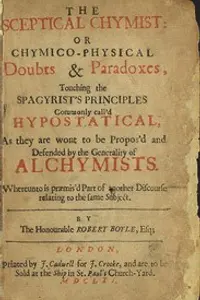Summary
The Sceptical Chymist is a groundbreaking scientific work by Robert Boyle, often regarded as the founding document of modern chemistry.
In it, Boyle challenges the classical Aristotelian and alchemical views of matter, particularly the idea that all substances are made up of the four elements — earth, air, fire, and water — or of three alchemical principles (salt, sulfur, and mercury).
Written in the form of a dialogue between fictional characters (Carneades, Themistius, Philoponus, and Eleutherius), the book presents a skeptical analysis of these traditional theories, advocating instead for an approach based on experimental evidence.
Boyle proposes that matter is composed of corpuscles (small particles) that combine in various ways to form different substances — a precursor to modern atomic theory.
The work also emphasizes the importance of empirical observation, careful experimentation, and reproducibility, marking a departure from mystical or speculative approaches to science. Boyle's insistence on clear terminology and methodical research helped lay the groundwork for the scientific method and inspired later chemists like Lavoisier and Dalton.
